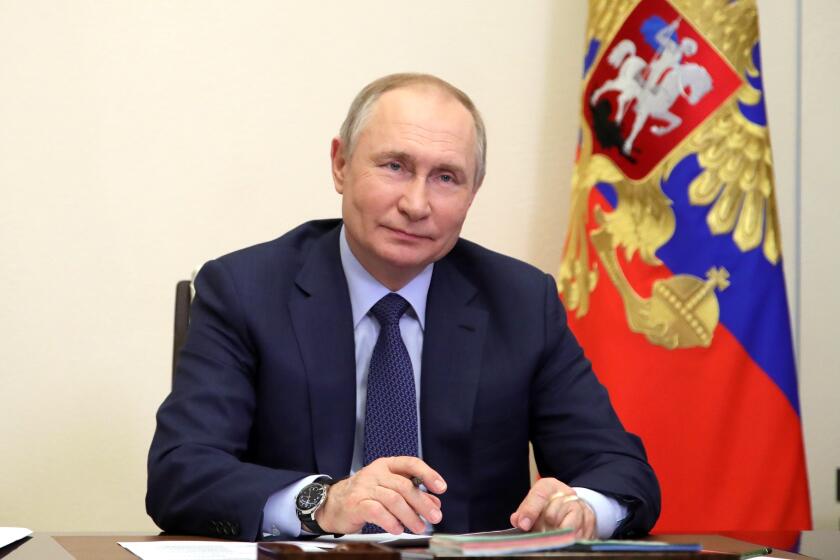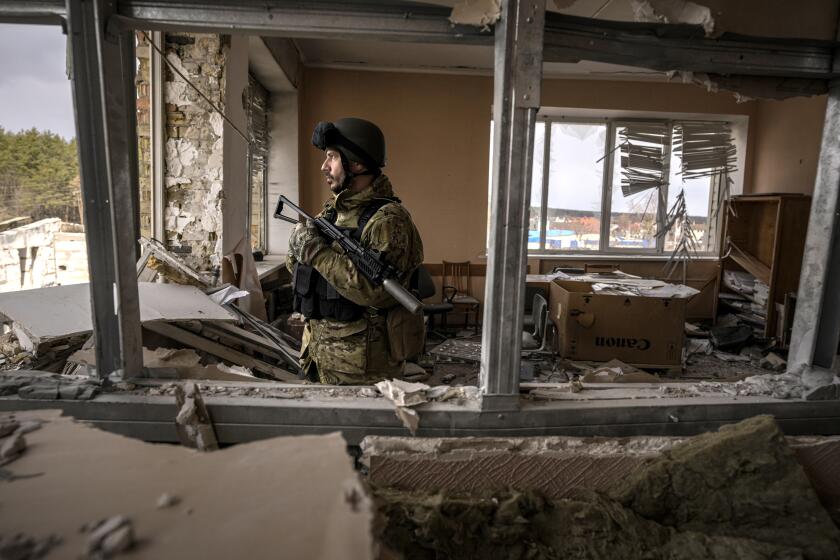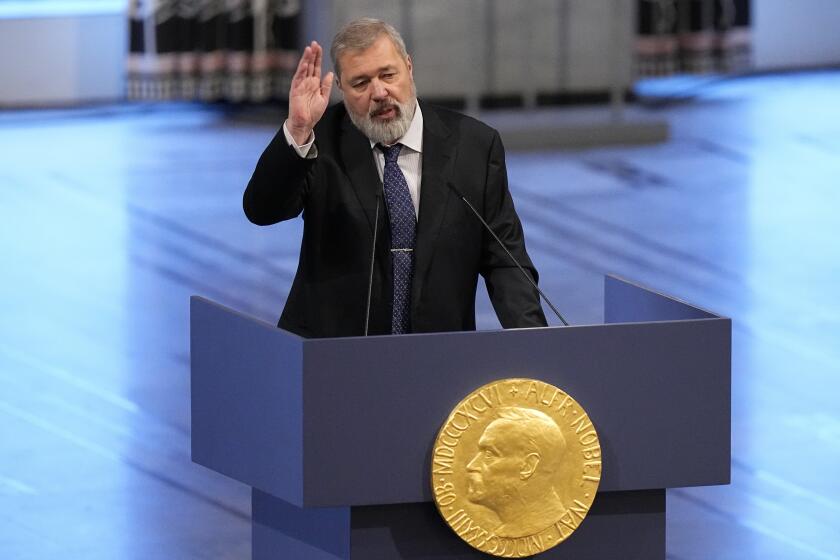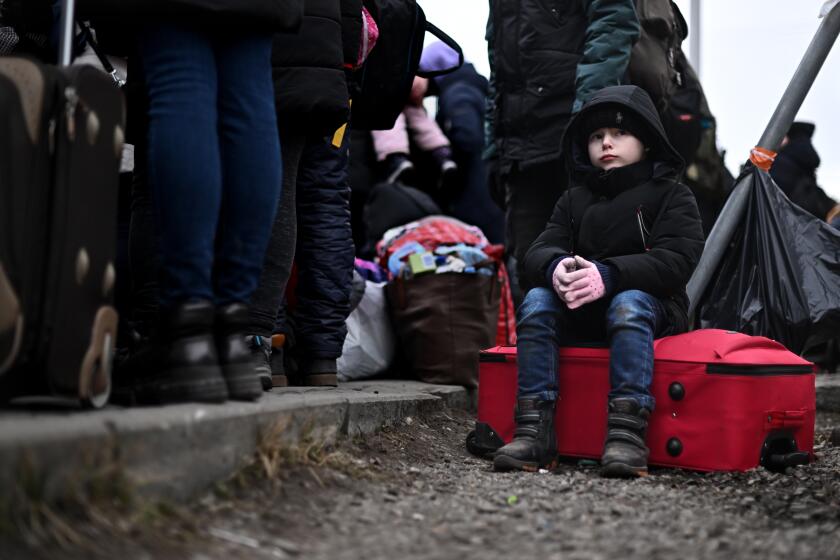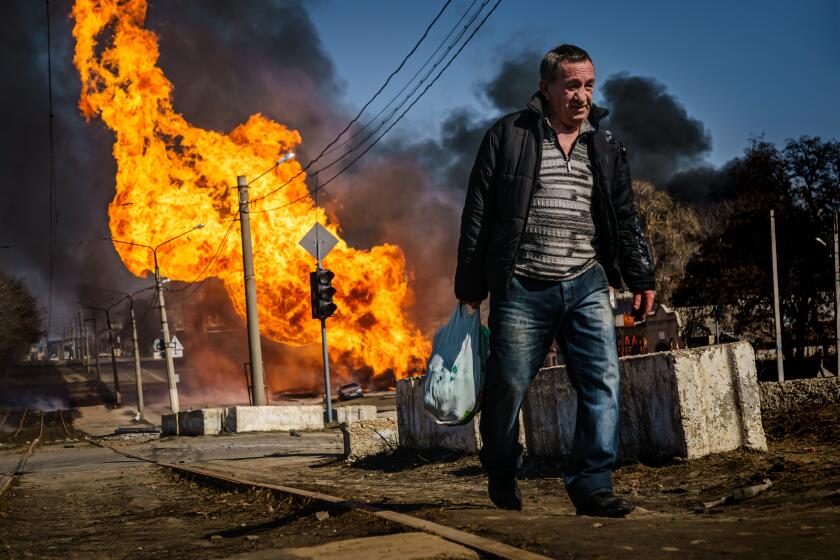A spiritual defense of the war in Ukraine? Putin’s patriarch is trying
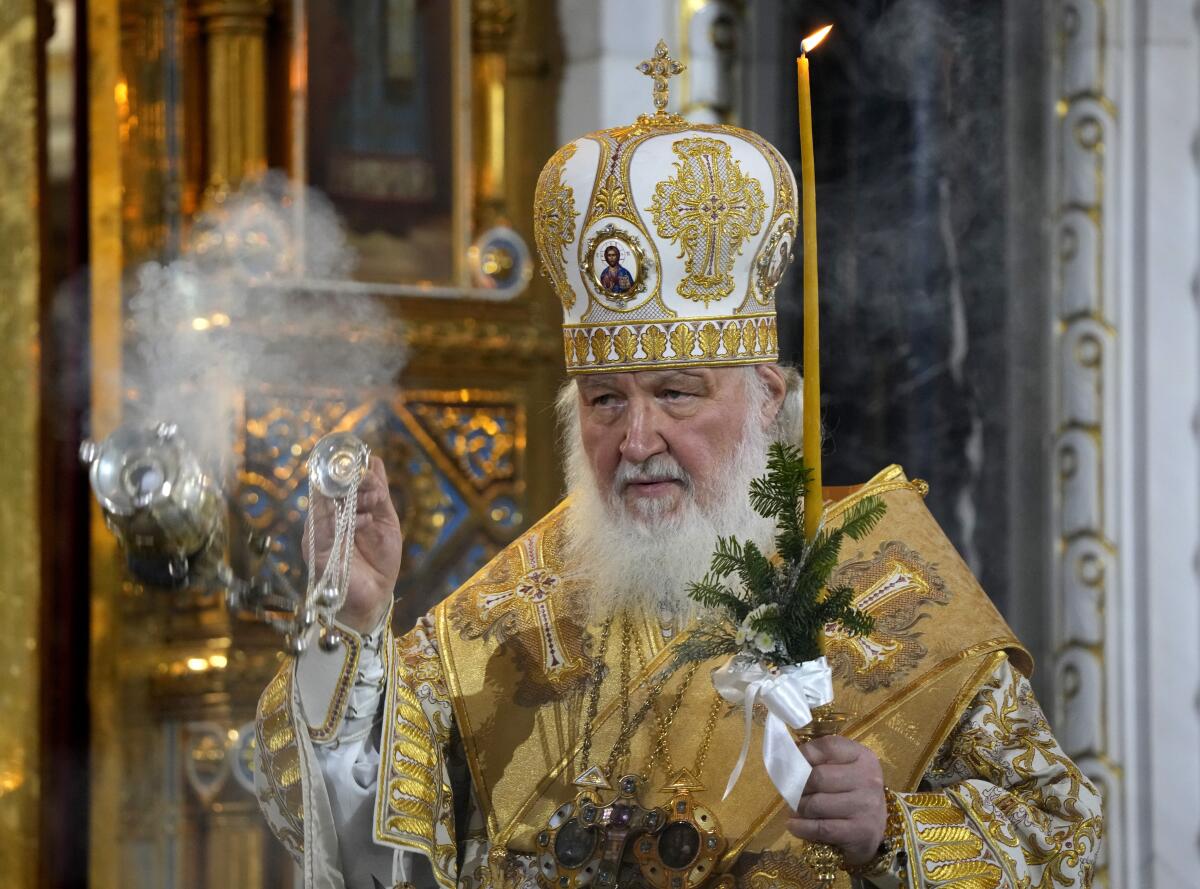
- Share via
Wearing crisp, olive-green robes and a towering, white head covering embroidered with the somber face of Jesus, Patriarch Kirill, the head of the Russian Orthodox Church, addressed the faithful from an ornate 10,000-seat cathedral in Moscow.
For weeks, religious leaders around the globe had been begging the bearded patriarch to speak out against the Russian invasion of Ukraine. But in weekly sermons that air live on Russian TV, Kirill, 75, has done just the opposite, painting the war as an apocalyptic battle against evil forces that have sought to destroy the God-given unity of Holy Russia.
The day before Russians marched on Ukraine, he congratulated Russian soldiers as defenders of the fatherland and said they “cannot have any doubt that they have chosen a very correct path in their lives.” Less than two weeks after the invasion began, he described the conflict as having “metaphysical significance” and warned his flock that the price of admission to the happy world of Western consumption and freedom was as simple as it was terrible: to agree to hold gay pride parades.
“We are talking about something different and much more important than politics,” he said. “We are talking about human salvation.”
Last week, the patriarch said it was “God’s truth” that the people of Russia, Ukraine and Belarus share a common spiritual and national heritage and should be united as one people — a direct echo of Russian President Vladimir Putin’s defense of the war.
“Someone must pray for our united people,” Kirill said, holding a gilded staff symbolizing his role as spiritual shepherd of the more than 90 million members of his church. “Someone must defend God’s truth that we are really one people.”
Putin’s war relies on an ultranationalist ideology pushed by far-right Russian thinkers who see Ukrainian nationhood as a fiction.
The same day, Ukrainian authorities accused Russian forces of bombing an art school where more than 400 people had sought shelter.
In a country where more than 71% of people identify as Russian Orthodox, Kirill is a powerful religious and political figure who has consistently refused to acknowledge the destruction, dislocation and growing death toll of the war in his frequent public statements.
“He lives in a parallel universe,” said UC Riverside professor Georg Michels, who specializes in Russian and Ukrainian history. “He describes the current situation in Ukraine as Russians defending against a foreign invasion, not as Ukrainians fighting for democracy, and their lives, against a Russian autocracy.”
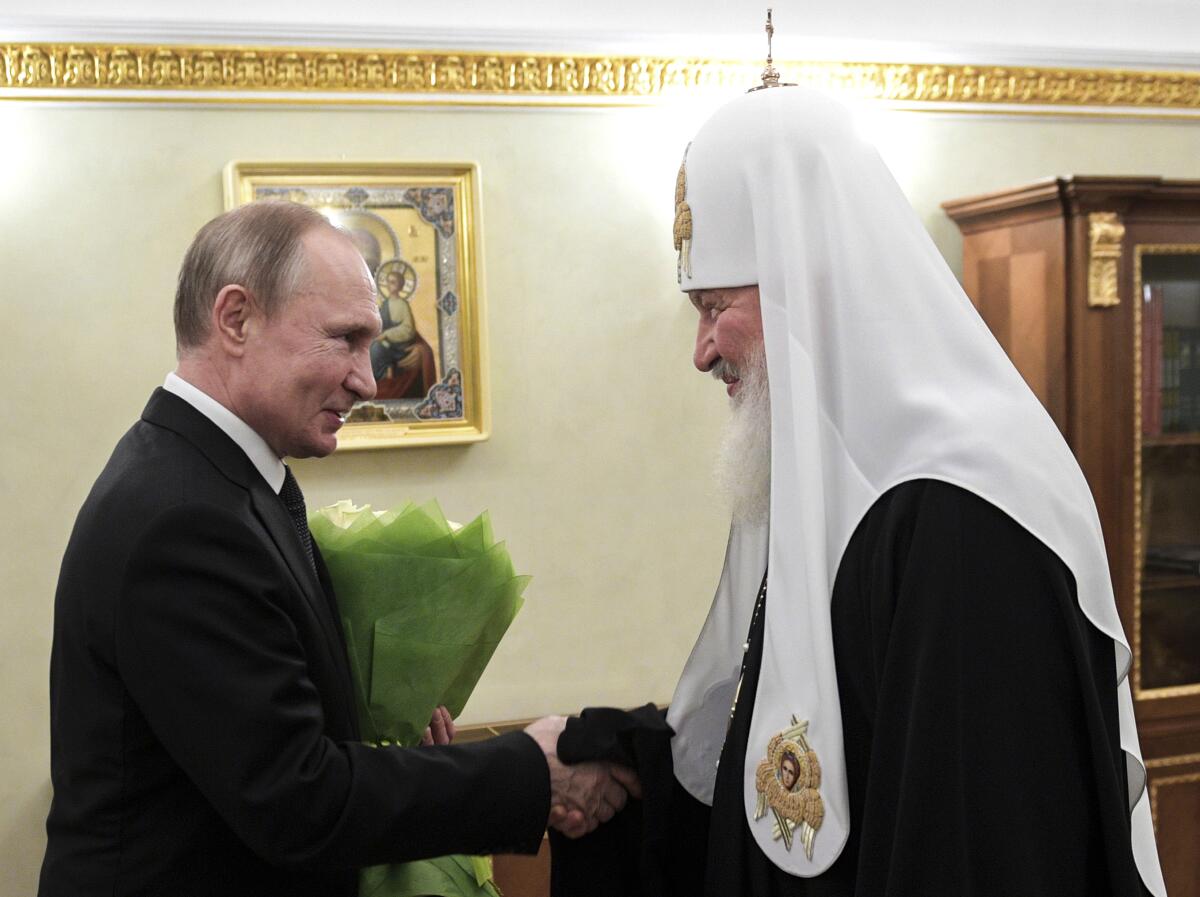
Experts say Kirill is a complex figure in Russian politics: smart, charismatic and an ambitious operator. He rose in the ranks of the Russian Orthodox Church during the Soviet period — when the communist government viewed religion as an archaic relic of oppression — and was the first patriarch of the Russian Orthodox Church to meet with a Catholic pope in nearly 1,000 years. He is also rumored to have been associated with the KGB, the former Soviet Union’s main security apparatus.
“To be fair, to become a church leader in the Soviet Union and get anything done at the time, you had to be affiliated with the KGB,” Michels said.
Kirill set off a scandal a few years after becoming patriarch when he was photographed wearing a $30,000 watch that was subsequently photoshopped out of an official image put out by the church. (A reflection of the watch remains visible in the picture.)
New talks between Kyiv and Moscow are set to open even as both sides downplay their prospects, despite a possible Ukrainian offer of ‘neutrality.’
He and Putin have long been close allies. Kirill once described the first 12 years of Putin’s rule as “a miracle of God.” Putin has said that Kirill’s father, who worked as a priest in Leningrad (now St. Petersburg), baptized him in secret in 1952. The two men frequently appear in public together: at Easter services, visiting monasteries and traveling to pilgrimage sites.
In recent years, Putin has increasingly highlighted his own religiosity: wearing a silver cross around his neck, kissing icons and famously immersing himself in the freezing waters of a lake in front of television cameras. The icy dip was a brazen display of manhood and an Orthodox Christian ritual to mark the Feast of the Epiphany.
But whether this represents a true spiritual awakening by Putin, or political theater, is hard to say.
“He sees religion as helping to give Russians a proud identity,” said John P. Burgess, professor of theology at Pittsburgh Theological Seminary and author of “Holy Rus’: The Rebirth of Orthodoxy in the New Russia.” “When Putin makes pilgrimages to the major Orthodox Russian sites and encourages restoring them, he’s saying, ‘This is something we can be proud of; this is beautiful and historic.’”
Russia’s leading independent newspaper, Novaya Gazeta, has suspended operations under pressure from Vladimir Putin’s government.
Putin and Kirill also share a nationalist ideology that, in their eyes, justifies the war in Ukraine.
As they see it, the origins of Russia and the Russian Orthodox Church date to 988. That’s when Vladimir I, the ruler of Kievan Rus’, which included parts of current-day Ukraine and Russia, converted to Eastern Orthodox Christianity.
“The way this narrative unfolds, there is an organic wholeness between the relation of the Russian and Ukrainian people, and if Ukrainians see it differently, it is only because they have been led astray and corrupted by the West,” said Victoria Smolkin, a scholar of communism and the Cold War at Wesleyan University.
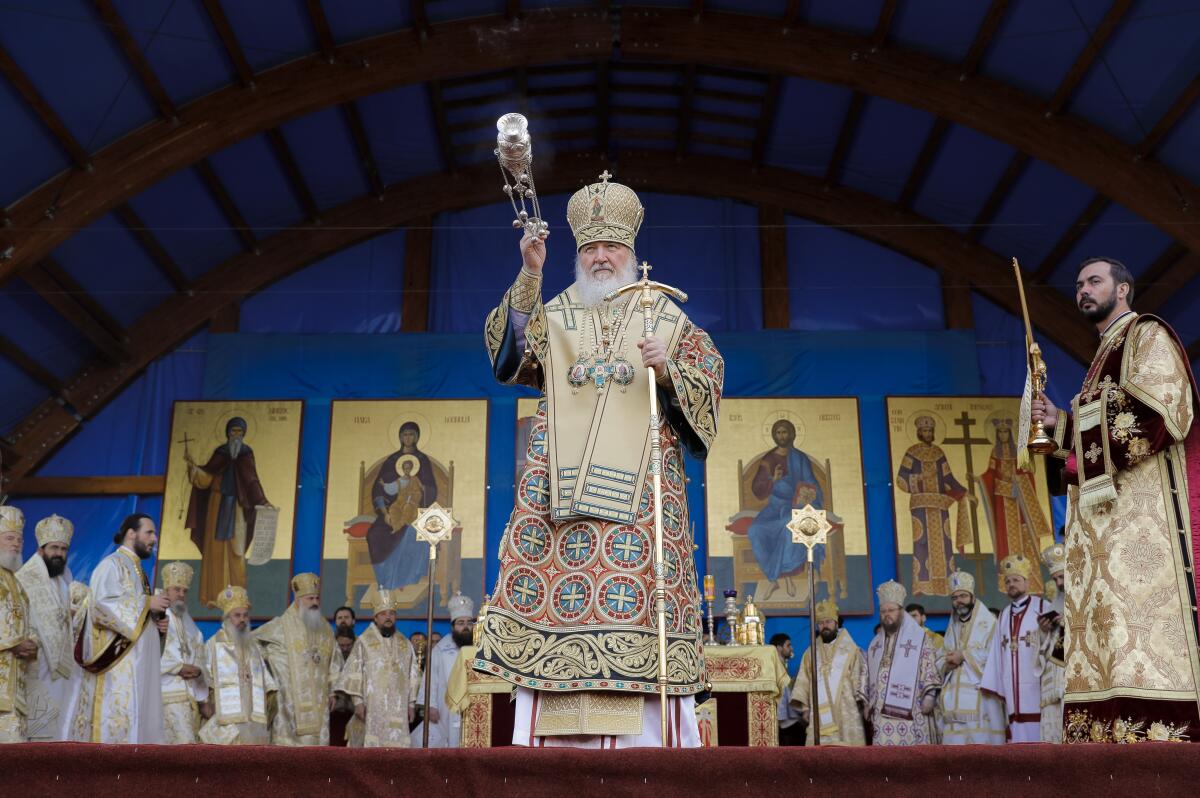
From this point of view, Russia is not attacking a sovereign nation-state; it’s restoring the natural relationship between two countries.
“What they are after is salvation,” Smolkin said. “Not just of the Ukrainians, but of themselves. They see it as their mission to establish unity.”
The schism between the two countries is not just geopolitical; it has played out in the church as well. For more than 300 years, the Ukrainian Orthodox Church was officially tied to the Russian Orthodox Church and overseen by the Moscow patriarch, but that is no longer the case. In 2019, the Ukrainian Orthodox Church was authorized by the patriarch of Constantinople to break away from Moscow and become autonomous. With 78% of Ukrainians identifying as Orthodox as of 2015, this reduced Kirill’s flock by one-third.
With unvaccinated refugees from Ukraine pouring into other countries, health officials hope to avert outbreaks of COVID-19 and other diseases.
“That was a big and significant event,” Smolkin said.
Kirill refused to accept that Orthodox Christians in Ukraine were behind the split and, in a sermon March 13, blamed the schism on political pressure from outside forces.
“It must be remembered that we all belong to the One Holy Catholic Apostolic Church — the same church as in Moscow and in Kyiv,” he said. “And God grant that we all preserve unity, regardless of any external pressures and any efforts alien to the church, to destroy the spiritual unity of our peoples.”
For decades, Russian church leaders have cooperated with the government in order to advance the interests of the church, said Stephen Batalden, professor emeritus of history at Arizona State University. But now, this tacit quid quo pro is being tested in new ways as the Russian state engages in what the U.S. has declared to be war crimes committed by Putin against Ukraine.
Start your day right
Sign up for Essential California for the L.A. Times biggest news, features and recommendations in your inbox six days a week.
You may occasionally receive promotional content from the Los Angeles Times.
“Kirill has failed disastrously to defend the integrity of the Russian Orthodox Church, and that has all kinds of ramifications for the splintering of the church,” Batalden said.
In the days after the invasion, some Orthodox parishes in Ukraine stopped commemorating the Moscow patriarch in their prayers during public worship, in open defiance of his authority. And some Russian Orthodox churches in other countries are denouncing the Moscow patriarchate or breaking ties altogether.
“The more churches and religious connections the Moscow patriarchate loses, the weaker its claims in the so-called Russian world,” Smolkin said.
However, it is unclear how much agency Kirill has to denounce the war. Nearly 300 Russian Orthodox priests in Russia signed an open letter appealing for peace, but that’s a small fraction of the 35,000 priests there.
What had been a thriving metropolis of nearly 1.5 million people, Kharkiv, remains in Ukrainian hands, but at an enormous cost.
“I think there is every indication that Kirill and Putin have overlapping interests, but it’s also hard to imagine Kirill taking a different position than the Kremlin,” Smolkin said.
The United States and other Western nations have also seen ties between political and religious leaders. During Francisco Franco’s rule in Spain, the Roman Catholic Church was granted legal status and other financial benefits while colluding with the fascist dictatorship. The evangelist Billy Graham was a friend and advisor to a procession of U.S. presidents. When President Trump was in office, evangelical leaders laid hands on him to pray. But experts say the relationship between Putin and Kirill is different.
“In U.S. politics, religious institutions are profoundly important, but they are autonomous actors. They can lobby and negotiate in their own right,” Smolkin said. “It is hard to see the Russian Orthodox Church as a fully autonomous actor independent of the Russian state.”
And yet, scholars say, the U.S. is not immune from the religious and political ideologies that Putin and Kirill are using to justify the war. Both men portray themselves as defenders of traditional Christian values against the excesses of an immoral and decadent West symbolized by gay pride parades, same-sex marriage and feminism, Batalden said.
“Right-wing politicians in America that are manipulating these same issues for their advantage are singing from the same choir as Vladimir Putin and Kirill,” he said.
More to Read
Sign up for Essential California
The most important California stories and recommendations in your inbox every morning.
You may occasionally receive promotional content from the Los Angeles Times.
